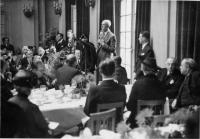As the crisis deepened, delegates to the Assembly were called into the armed forces of their different nations. Buchman's closing speech dealt with the massive moral mobilisation needed to 'answer the aching hunger of mankind for peace and a new world'.4 Then other delegates left for home. As Gudrun Egebjerg, the Danish journalist, sat having lunch at the railway station just before her train left to cross Germany to Denmark, a car drove up. 'Buchman walked straight to our table', she recalled later, 'and said to me, "You looked so sad this morning. I just want to leave this with you: 'I can do all things through Christ who strengtheneth me.' Goodbye," and he was gone.'
'I had never seen that side of Frank before,' Miss Egebjerg added. 'The leader, the statesman I knew. The gay, warm laughter, the sharpness and challenge; but never before this simple deep compassion, taking time on a very full day to drive across town to say a last word, just because he remembered a gloomy face.' It was one of many such incidents. Another participant in the Assembly, General C. R. P. Winser, remarked, 'Far from being obsessed by the crisis, Buchman was thinking for everyone and of everyone.'

Buchman took a team to Geneva for a luncheon at the invitation of League delegates, which Hambro had delivered personally at Interlaken. The luncheon was held on 15 September 1938, the day Chamberlain flew to meet Hitler in Berchtesgaden. Buchman's hosts were four leading political delegates to the League,* and diplomats from fifty-three countries were present. Hambro introduced Buchman and his colleagues to his fellow diplomats: 'Where we have failed in changing politics, they have succeeded in changing lives, and giving men and women a new way of living.'5
(* C. J. Hambro, J. A. E. Patijn, N. W. Jordan of New Zealand and V. V. Pella of Roumania.)
Patijn, now Dutch Foreign Minister, told how tension had grown between his country and Belgium, while he was Ambassador there. The International Court at The Hague had decided against the Netherlands in a vital case, and he himself had been annoyed by the way certain Belgian papers reported the affair, making the Netherlands look ridiculous. 'At that time', he continued, 'I had to speak at an important dinner in Brussels. It was suggested I should talk about the case. I resolutely refused. But just before I was about to respond to the toast, the conviction came to me that I had to refer to the dispute. I complimented my hosts on their success and said that in the future we should be better friends. From that day all bitter comments against my country ceased.' 'The fact that I was able to make such a speech', Patijn added, 'was only because of my deep conviction that it was much more in accord with God's will than the speech which I had previously wished to make.'6
274
Photo: Holland's Foreign Minister speaks to League of Nations delegates. Extreme right: Buchman and Carl Hambro, President of the Norwegian Parliament.
©Arthur Strong/MRA Productions